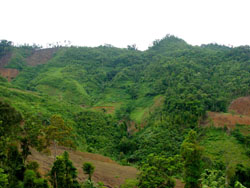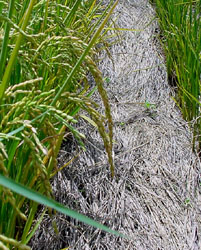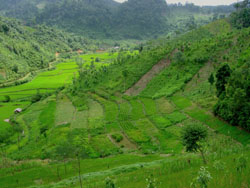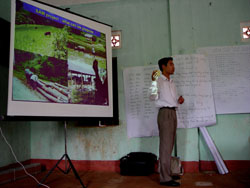
Objectives
In a context of lack of land in the low lands and of environmental degradation on the uplands, the "Cropping Systems" component of the SAM program aims at :
- Understanding
the functioning
of
traditional agrarian systems (agriculture and animal husbandry) using
slash-and-burn practices and free grazing, and identifying the main
constraints of these practices. Evaluating the agro-ecological and socioeconomic
viability of these practices;
-
Developing alternatives
to slash-and-burn. This process is based on the principles of sustainability,
especially in the agronomic and environmental domains, and integration
of biological and social diversity;
- Working towards the extension of these alternatives to farmers and agricultural training institutions (national services and development projects).
This is an on-site research, conducted in real time. Its function is to rapidly bring technical alternatives to a rapidly evolving situation in which mountain agriculture finds itself at a dead end. Research activities are mainly conducted at the scale of the individual plot and farm.
Hypothesis

- The present
situation of high demographic pressure has lead to a shortening of the
fallow periods in slash-and-burn systems on slopes. These systems are
no longer viable due to their negative effects on agricultural performance
(physical, chemical and biological fertility degradation, increasing
weed pressure) and on the environment (erosion, bio-diversity prejudice);
- Cropping systems
based on direct seeding on vegetal cover (SCV, the French acronym for
“Systèmes de culture avec couverture végétale”)
have been developed in different countries. Their adaptation in the
context of the mountainous regions of Northern Vietnam could be an alternative
to present practices;
- These innovations require a change in stakeholders’ mentalities (researchers, developers and farmers). Their adoption is impossible without appropriate support in the form of expertise as well as technical and educational services.
Methods
The adopted methodology is based on the “Creation- Training-Extension” approach developed by CIRAD in Brazil and applied elsewhere (Madagascar, Laos, Ivory Coast, Réunion Island).
Creation

In the experimental sites and the multi-locality network, applied research
actions are conducted, allowing for the creation and evaluation of innovative
cultivation systems based on SCV and agro-ecology:
- Production
system matrixes (rotations, animal husbandry and forestry integration),
- Theme trials
to fine-tune the technology (varieties X fertilization, agricultural
material, cycle adjustment, plant protection, adaptation of crops in
function of cover types, varietal screening…),
- Seeds multiplication
for provision to national agricultural services and seed farmers for
large-scale multiplication,
- Socioeconomic
evaluation of techniques proposed for extension,
- Evaluation of the environmental impact (erosion and protection of stream and infrastructures, carbon sequestration, soil biology, water resource management, organic matter evolution, improvement of living conditions and bio-diversity).
Training

Training starts at the beginning of the process. It allows for the expression
of preoccupations and the production of a diagnostic. It helps define
a protocol and a contract between the farmer and other partners. Generally
speaking, it strengthens the idea of a approach (with the active and rigorous
participation of the farmer) which will mobilize means for training, research
and development of infrastructures. It plays a key role of activity organization
and mediation. Other partners are then mobilized in function of questions
and opportunities.
Extension
Extension consists of developing specific actions of technical support to development projects and national services. It begins at the creation of innovation during research activities, hence the interest of being able to address questions as they appear. The more successful this phase, the faster and better the extension to farmers level. It is important that development stakeholders participate in this research activity so as to master the techniques and to be able to efficiently answer the needs of the farmers. For larger extension, visits and different media supports are used. The multi-locality trial network is thereby a real "field school".
Activity Calendar
| Alternatives to slash-and-burn | ||
| Diagnostic |
||
| SCV
elaboration |
||
| Support
to extension |
||
| Thematic
Studies |
||
| Soil
evolution |
||
| Weed
management |
||
| Large
ruminant feeding |
||
Training
Between 1998 and 2002 the SAM-Cropping System component contributed to training through research according to various modalities:
- Permanent training
of the ten project members on technical innovations
- Hosting twelve
trainees from the Thai Nguyen Agriculture and Agroforestry University,
two trainees from the Hanoi Agricultural University (with specialties
in agrarian management and crop-vegetal cover), one trainee from the
Hanoi Natural Science School (Biology speciality), for their agronomic
engineer end of studies internship; seven were recruited into the project,
- Theoretical
and practical training, over several months, of sixteen staff from Cho
Don District Agricultural Services, in relation to the Vietnam-Finland
Forestry Sector Cooperation Project.
- Training of
French or foreign students; two tropical agronomy diplomas, one DEA,
one Masters of Science, and one PhD,
- Training of
four young French graduates during their National Military Service.
- Contributions made to national and international collective training on SCV and related themes (soil studies, weeds science, large ruminant feeding systems…)